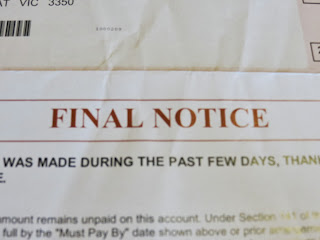There's only so much a school can cram into a curriculum, and there is a fine line, which is strongly debated by many, about what schools should and shouldn't be teaching in kids.
But in a conversation with my brother (you met him a few weeks back in Flies, Honey & a Soccer Ball), we were talking about "real life learning". The things you never learned at school, but wish you had. Things like banking, saving, building and protecting your credit rating, how to vote, superannuation, how to read contracts and bills, house and car loans, relationships, dealing with emotions...and all those things you suddenly have to know how to do magically when you become an "adult".
I still have hardly any idea what I signed when I bought a house. It took me and my husband into our late 20s and early 30s to teach ourselves how to budget and save money. We learned from TV celebrity Kochie. Even when I went to vote last week I followed the instructions, but all the guff about Upper & Lower Houses and Senates and things is just over my head. Some of my brother's mates weren't even sure which politician they had actually voted for when they ticked the boxes for the different parties.
And at my age, I know I want to learn about superannuation and how to set our family up for the future, but it's really hard trying to find that information without it being all salesy, and trying to get me to sign up for things.
So when do you start teaching kids about these sorts of things? How do you start? Is it up to the school to run a new program? Do you incorporate these concepts into projects of existing classes? Or is it up to the parents to teach them? But what if the parents aren't up with it either?
I've got a few ideas, but I'd love to hear yours! Are you a school teacher? I'd love to know your thoughts, or what your school does. I'll get the ball rolling though.
- Start young. These are life skills that you can't learn over night.
- Open a kids bank account or start a money box that doesn't open. Start good saving habits early with pocket money earned from chores / jobs. Save 50%, Spend 50% on a treat. Set a goal and aim for something great. That sense of achievement of paying for something with your own money you saved up for is second to none!
- Games like Monopoly could be good too, but only if you follow the instructions to the T.
- Talk to the kids about what's happening at home with bills and loans. I know kids have a tendency to be brutally honest to strangers, so maybe keep the numbers to yourself, but the general concept of what you're doing could be helpful for them when they grow up. I used to watch my Mum do the budget every week on her calendar and put cash into little pockets and envelopes for the things we needed. This worked for me to begin with, but now that cash is so digital it doesn't quite work anymore. But it was a great help to get me started on saving and stashing my cash for the things I needed and wanted. PS I don't do that anymore, so don't bother looking under my mattress! lol.
Leave your comments on here or on the Facebook page. I'd love to hear your thoughts, or what you do now at your place or school?



Very wise. I too have no idea how parliament works .... even thou we did learn about it at school!!!
ReplyDeletehahaha we had government lessons in class too, but they just didn't stick! Not relevant at the time? But maybe that's the key? Relevance and timeliness? Should we have "adult school" when we hit 18???
ReplyDeleteGreat post Louise, we are starting to tell our kids that money doesn't grow on trees and that we need to save it for rainy days. So now Noah is saving and also being very generous when Mum and Dad don't have cash in their wallets but he always leaves us an I O U note ;-)
ReplyDeleteHave a fabulous weekend x x x Dani
That's great, thanks Dani :)
DeleteGreat post. Did you know that Credit Cards can be used for whatever you want whenever you want and they don't need to be paid back? So we have been informed by our 9yo when she wanted something and we didn't have the cash!!
ReplyDeleteWe sometimes use a digital equivalent of the "little pockets and envelopes" technique. We have several "high" interest online accounts with names describing what we are saving for eg Holiday, Rainy Day, Christmas.
However if you have an offset account on a mortgage be aware that what you are earning on these "high" interest rate accounts is less than what you save by keeping the money in the offset account (and the interest on the High Interest Rate accounts is taxed which roughly halves the interest you are paid!!
Sorry this comment was a bit late!! XXX
hahaha well hopefully she's learning quickly now!
Delete